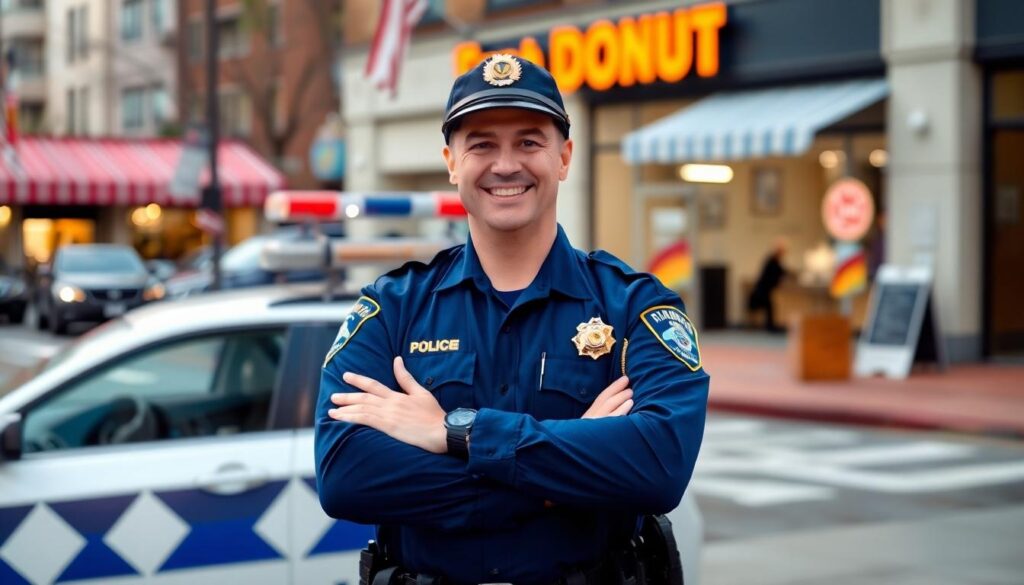Laughter and law enforcement might seem like an unlikely pair, but we’ve found that police humor can lighten even the most tense situations. From the iconic donut jokes to the playful banter between officers, law enforcement jokes have become a cultural staple that brings smiles to faces across America.
We’ve compiled this collection of the most hilarious law enforcement jokes that’ll have you laughing all the way to the station. These jokes celebrate the lighter side of policing while acknowledging the challenging work our men and women in blue perform daily. Whether you’re a police officer looking for some workplace humor or simply someone who appreciates a good laugh, you’ll find something to tickle your funny bone here.
Lighthearted Police Puns That Will Have You in Cuffs of Laughter
- Why did the police officer go to art school? Because he wanted to learn how to draw his weapon better!
- What do you call a cop who sleeps on the job? Under a-rest!
- How do police officers like their donuts? With coppings on top!
- Why don’t police officers like to play cards? Because they’re always looking for the jack!
- What’s a police officer’s favorite type of music? Cop rock!
- Why was the police station so cold? Because all the cells were open!
- How do police officers cut their pizza? With a weap-on!
- What did one sheriff say to the other sheriff? Let’s round up the usual suspects!
- Why don’t criminals like sudoku? Because they’re afraid to be caught in a cell!
- What’s a police dog’s favorite TV show? Paw Patrol!
- Why did the detective bring a ladder to the crime scene? The case was reaching new heights!
- What did the officer say to his belly button? You’re under a vest!
- Why are police officers great at baseball? They know how to handle the bats!
- What’s a police officer’s favorite dessert? Copcakes!
- How do police officers stay in shape? They do plenty of cop-tain crunches!
- Why did the burglar take a shower? He wanted to make a clean getaway!
- What’s a police officer’s favorite sandwich? One with extra patrolami!
- Why do police officers make great fishermen? They know how to catch the big ones!
- What did the detective say when he solved the case? That’s arresting development!
Classic Law Enforcement One-Liners Every Cop Has Heard
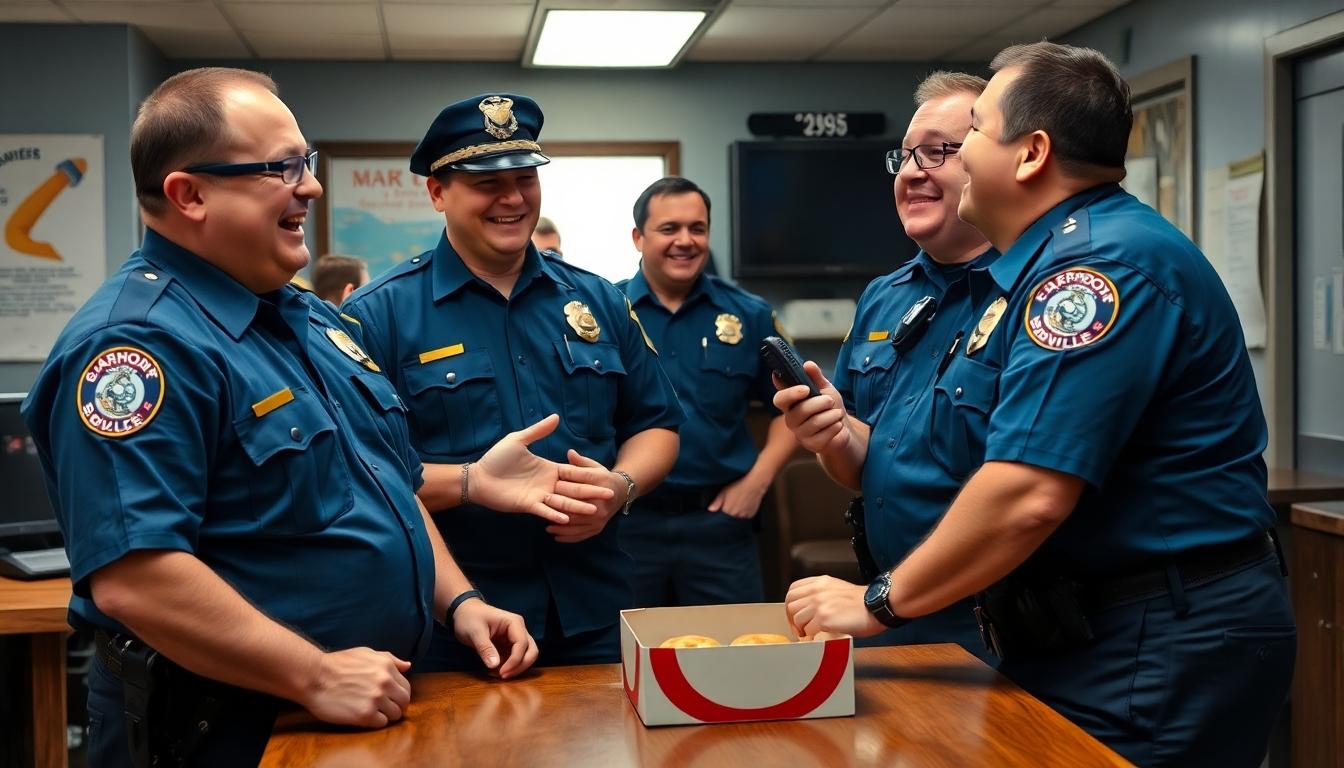
Every police officer has a collection of one-liners they’ve either used or heard throughout their career. These classic quips have become part of law enforcement culture, often used to diffuse tension or add humor to routine situations. From traffic stops to patrol encounters, these witty remarks never seem to go out of style.
Station House Humor That Never Gets Old
Station house humor revolves around the everyday life of police officers and the stereotypes that come with the job. The infamous donut jokes remain prevalent, with civilians often quipping, “I was rushing to the donut shop, officer… I wanted to make sure I beat you there.” Self-deprecating humor like this has become a staple in police stations nationwide.
Word play dominates station banter, especially when discussing unusual cases. Officers might joke about arresting the Energizer bunny for “battery” or investigating a murdered baker named “John Dough.” These puns keep the mood light even though the serious nature of police work.
Interrogation room humor features circular conversations that highlight the absurdity of some suspect interactions. When an officer asks, “Where do you live?” and receives the answer “Together,” it perfectly captures the frustrating yet sometimes comical nature of questioning reluctant suspects.
Radio Chatter Jokes That Bring the Static
Radio communication provides endless opportunities for humorous misunderstandings. Officers regularly share stories about suspects claiming the alphabet starts with “Malphabet” or other bizarre miscommunications that occur over crackling radio channels.
Protocol-based humor resonates strongly with law enforcement professionals. The rookie who resolves to “call for backup” if forced to arrest his mother represents the light-hearted way officers navigate potentially challenging situations while maintaining procedure.
Traffic enforcement generates particularly hyperbolic one-liners, with officers joking about their perceived superhuman abilities like “I can stop a 10-ton truck with my hand.” These comments playfully exaggerate the authority vested in law enforcement while acknowledging the sometimes theatrical nature of traffic stops.
When pulling over speeding drivers, officers might deliver classics like “You know, stop lights don’t come any redder than the one you just went through” or comfort nervous suspects with sarcastic reassurance: “Relax, the handcuffs are tight because they’re new.” These lines have become so ingrained in police culture that most officers can recite them verbatim.
Hilarious K-9 Unit Jokes That Will Make You Howl
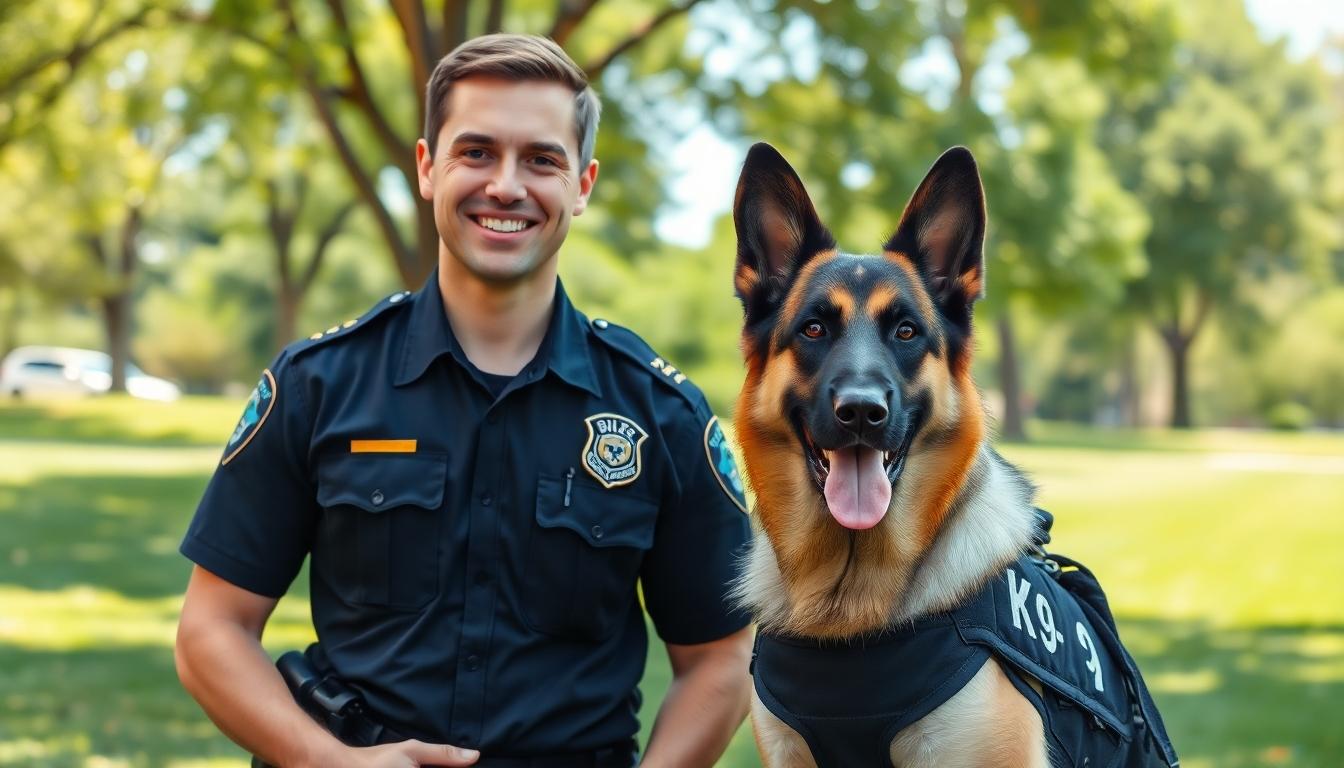
Police K-9 units combine the serious work of law enforcement with our four-legged friends, creating a perfect breeding ground for humor that helps officers cope with daily stresses.
Canine Partner Quips That Hit the Mark
K-9 officers often use gallows humor to bond with their colleagues and process the challenges of working with canine partners. “My K-9 partner has the best arrest record in the department—he works for treats and never complains about overtime!” Police handlers frequently joke that their dogs have better discipline than most rookies on the force. “Asked my sergeant why my K-9 partner doesn’t have to wear a uniform. He said it’s because he’s already wearing a fur coat!” These quips serve as important professional coping mechanisms, allowing officers to maintain emotional detachment while building camaraderie with fellow officers[1][5].
Research shows that this type of strategic humor helps build essential connections within police organizations, particularly important in specialized units like K-9 where trust between handlers and their partners is paramount[4]. “My dog’s so good at finding evidence, I’m pretty sure he’s solving cases while I’m doing the paperwork!” Officers share these jokes during training sessions and between calls, creating an inclusive environment that strengthens their working relationships.
Dog Training Humor for the Badge-Wearing Set
Training humor forms a important part of K-9 unit culture, often reflecting the complex relationship between handlers and their canine partners. “My dog graduated top of his class at the academy—he was the only one who didn’t chew his diploma!” Training sessions provide rich material for jokes that help officers process the demanding nature of preparing police dogs for duty. “Tried to teach my K-9 partner about Miranda rights, but he just keeps barking ‘You have the right to remain silent!'”
The exclusion and inclusion dynamics of police humor can be particularly evident in K-9 training settings, where newer handlers might find themselves the butt of jokes until they’ve proven themselves[2]. “Asked the trainer how to get my dog to stop digging holes in the yard. He said to convince him there’s cocaine buried in my neighbor’s yard instead!” These jokes, while humorous within the profession, must be carefully managed in public settings to avoid negative perceptions about police ethics and professionalism[1]. K-9 officers understand that their unique brand of humor, while essential for mental health and team building, requires appropriate context to avoid misinterpretation by those outside the profession[3].
Donut Jokes: The Sprinkled Stereotype Law Enforcement Can’t Escape
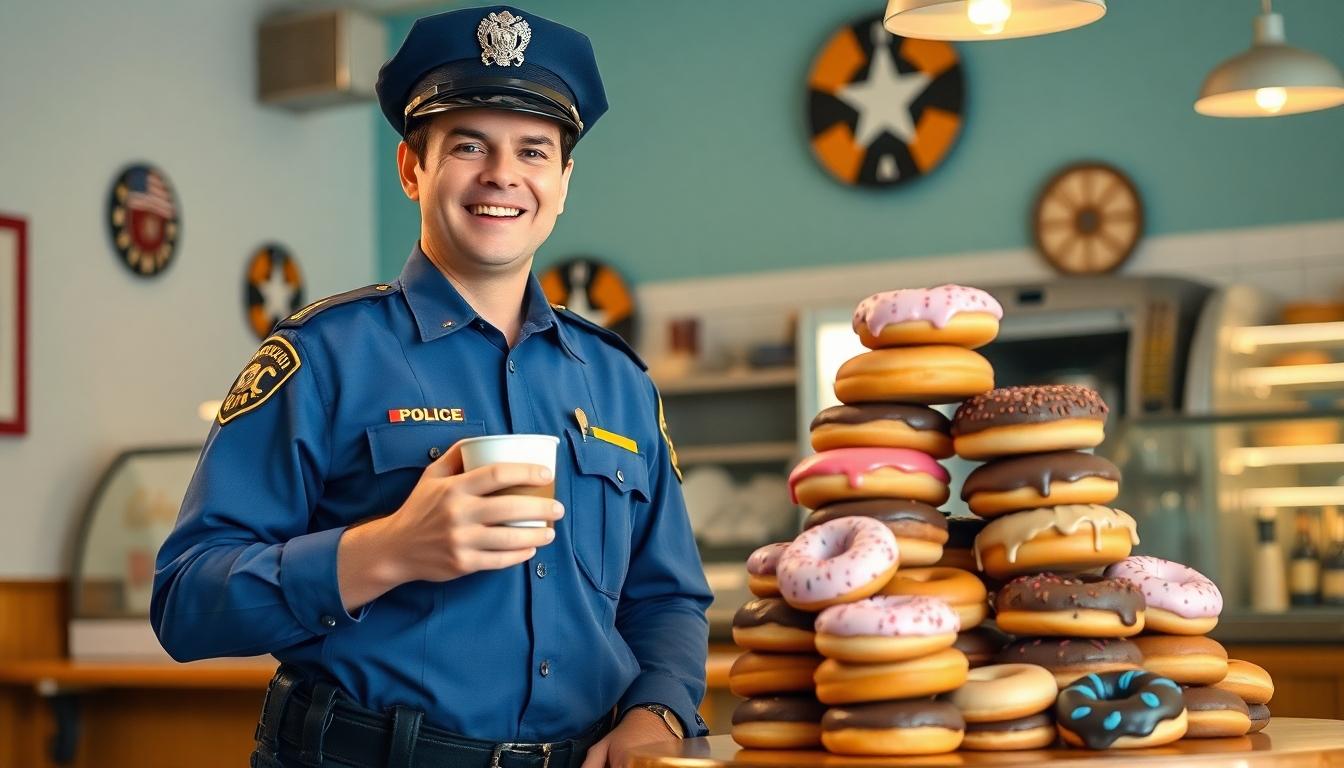
The iconic association between police officers and donuts wasn’t born from thin air but rather emerged from practical circumstances dating back to the mid-20th century. During the 1950s, donut shops established themselves as rare late-night businesses that welcomed officers working graveyard shifts when few other establishments remained open. These shops strategically offered free coffee and donuts to law enforcement, creating a mutually beneficial arrangement where police presence deterred potential criminals while officers gained access to much-needed refreshments and restroom facilities during long patrols.
Media portrayals significantly amplified this connection, transforming a practical relationship into an enduring cultural stereotype. Popular films and television shows frequently depicted officers making late-night donut runs, often exaggerating officers’ supposed dependence on the sweet treats. Many jokes center around the humorous notion that police prioritize donuts over their actual duties, with classic one-liners like “Must be a donut shop getting robbed” when multiple patrol cars respond to emergencies.
Several practical factors explain why this stereotype has maintained its grip on public imagination:
- Convenient Availability – Donut shops’ extended operating hours perfectly aligned with overnight police shifts when other food options were scarce
- Practical Portability – Donuts’ compact size made them easy to eat in patrol cars without creating important mess
- Impressive Shelf Life – Unlike many foods, donuts remain edible throughout long shifts without refrigeration
- Community Connection – Free offerings from shop owners encouraged regular police visits, strengthening community relationships
Police officers typically react to donut jokes with good humor rather than offense. Many embrace the stereotype, sometimes gifting donuts as gag presents at department gatherings or retirement parties. The joke carries minimal malice compared to other stereotypes, functioning more as lighthearted shorthand for police culture than genuine criticism of law enforcement.
This enduring cultural connection underscores how stereotypes can develop from practical historical circumstances rather than factual obsessions. Donut jokes have secured their place as perhaps the most recognized and least controversial humor staple in law enforcement lore, providing a relatable point of connection between officers and the communities they serve.
Ticket Writing Humor That Deserves No Citations
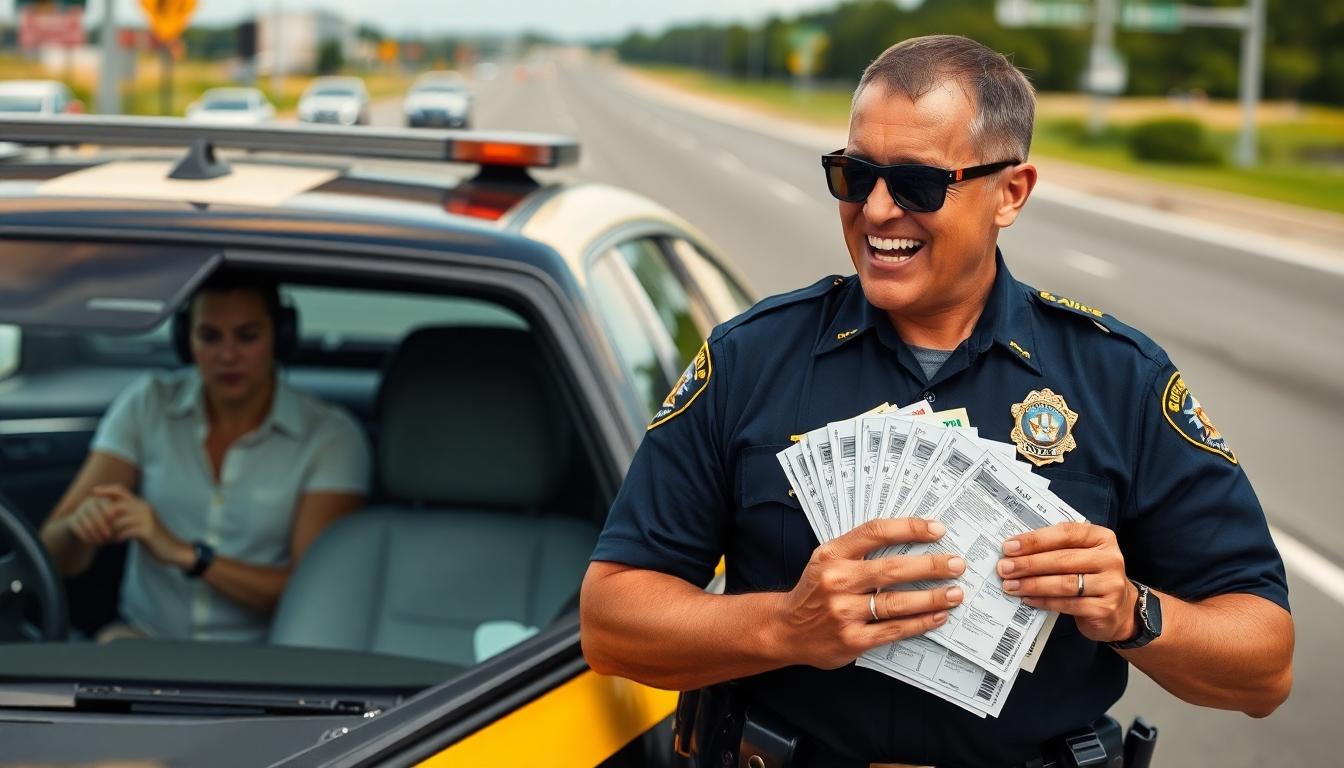
Escalation Comedy: When Traffic Stops Go Hilariously Wrong
Traffic stop humor often revolves around the classic “provocation to escalation” pattern where drivers make increasingly poor decisions. Officers in these jokes respond to driver insults with creative citations, adding fictional violations like “bald tires” or inventing new infractions on the spot. One popular joke features a driver calling an officer a “pencil-necked nazi,” only to receive a growing stack of tickets that culminates in the ultimate punchline: the vehicle isn’t even theirs. These scenarios capture the futility of arguing during traffic stops while exaggerating the power dynamics at play.
Backseat Driver Blunders: When Passengers Make Things Worse
Nothing derails a routine traffic stop faster than a “helpful” passenger speaking up at exactly the wrong moment. The “drunk husband” scenario represents a perfect example where spouses inadvertently sabotage drivers by revealing prior violations or incriminating details. Picture an officer asking about a broken taillight, only for the passenger to helpfully add, “And that’s not all – he’s been drinking since noon!” These third-party sabotage jokes highlight the relatable fear of loved ones accidentally making a simple ticket much more serious with their well-intentioned honesty.
Literal Interpretation Laughs: When Communication Breaks Down
Miscommunication forms the backbone of some of the funniest ticket-writing jokes in law enforcement humor. Officers in these scenarios apply rules with hilariously dogmatic precision, such as ticketing a driver for not wearing their prescribed glasses even though clearly wearing contact lenses. The humor stems from the visual or verbal misunderstanding, like when an officer interprets a driver’s mention of “contacts” (meaning lenses) as referring to nepotistic connections to avoid a ticket. These jokes satirize the occasionally rigid application of traffic laws while playing on the universal experience of being misunderstood at the worst possible moment.
The Endless Citation: When Tickets Keep Multiplying
The structure of “endless ticket” jokes capitalizes on the fear every driver has when pulled over – receiving multiple citations from a single stop. In these comedic scenarios, what begins as a simple speeding ticket transforms into an absurd catalog of violations, each more outlandish than the last. Officers methodically write citation after citation while drivers watch in horror as their fines multiply exponentially. These jokes serve as cathartic exaggerations of real-industry traffic stops, allowing both officers and civilians to laugh at the bureaucratic nature of law enforcement while highlighting the often-futile attempts to talk one’s way out of a ticket.
Patrol Car Comedy: Humor From Behind the Wheel

Law enforcement officers often rely on humor to cope with the unique stresses of their profession. The patrol car becomes not just a workplace but a space where comedy thrives, helping officers maintain their psychological resilience during long shifts.
Partner Banter That Makes Shift Time Fly
Patrol partners develop a unique comedic rapport that transforms monotonous hours into bearable—sometimes even enjoyable—shifts. Research shows that this partner banter serves as a strategic tool for managing the repetitive nature of patrol work and acts as a “barometer” for emotional regulation. Crime scene investigators and patrol officers share inside jokes about recurring incidents or absurd situations they’ve encountered, creating a shorthand language that strengthens their bond. These humorous exchanges foster essential team cohesion, allowing officers to process traumatic experiences without internalizing them. Ethnographic studies confirm that partner humor reinforces group identity and trust, particularly important when officers must rely on each other in high-stakes situations. The shared gallows humor helps maintain emotional detachment from disturbing scenes while simultaneously building the tacit knowledge necessary for effective teamwork.
Traffic Stop One-Liners That Break the Ice
Traffic stops represent some of the most tense yet routine interactions officers have with the public, making them perfect opportunities for strategic humor. Officers often deploy lighthearted remarks during these encounters to humanize themselves and reduce civilian anxiety. Studies emphasize that contextually appropriate humor can transform potentially adversarial situations into more cooperative exchanges. These one-liners typically leverage irony or self-deprecation to establish rapport quickly with stopped drivers. Traffic stop humor serves multiple purposes: defusing tension, establishing authority without aggression, and creating a brief moment of connection during an otherwise stressful interaction. The effectiveness of these jokes depends entirely on the officer’s ability to read the situation correctly, as humor must always remain secondary to professional conduct and safety protocols. While exact examples aren’t documented in research, this situational comedy represents a practical application of emotional intelligence in law enforcement contexts.
Courtroom Jests: When Law Enforcement Meets Legal Eagles
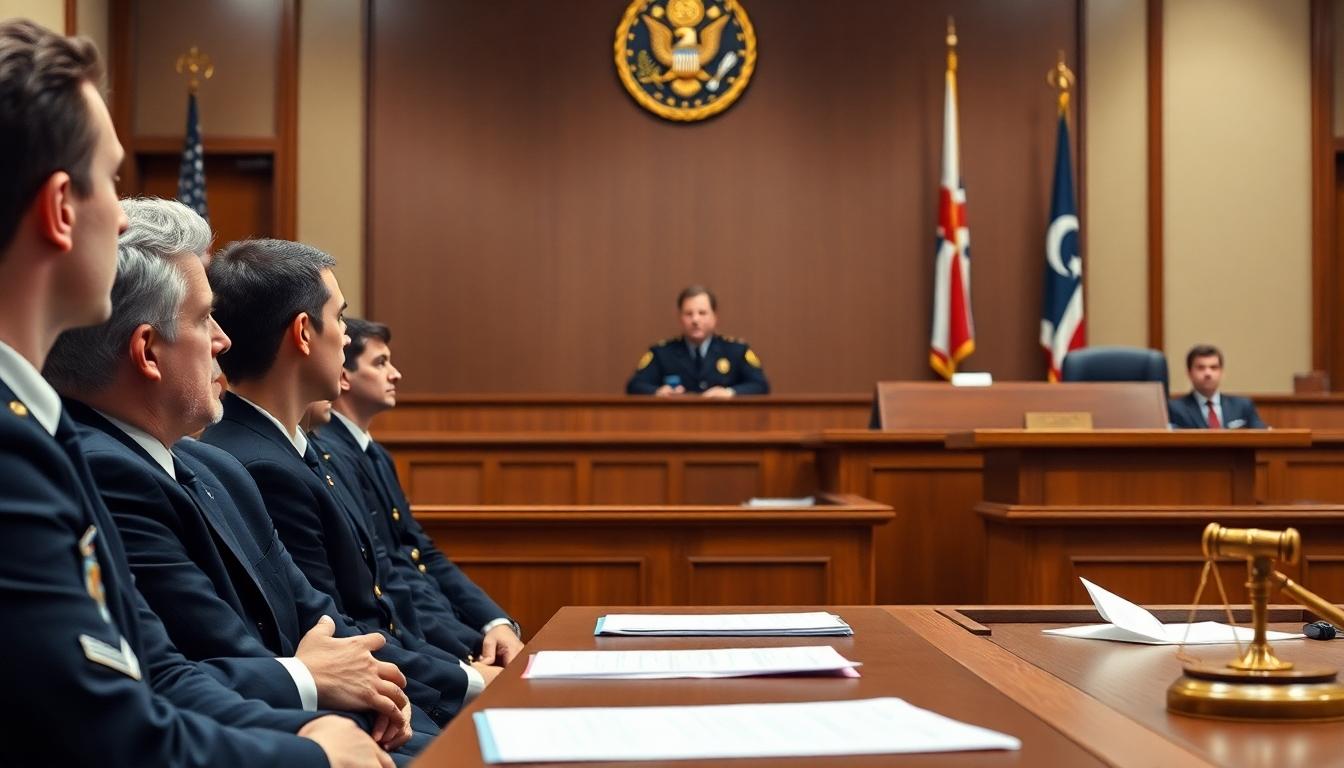
The courtroom offers a unique arena where law enforcement officers and legal professionals engage in witty banter that often serves as strategic communication. Officers frequently use humor in these formal settings to ease tension while maintaining professional boundaries. Legal proceedings, even though their serious nature, become breeding grounds for subtle jokes that help officers cope with the psychological strains of testifying.
Testimony Humor
Courtroom testimony creates prime opportunities for law enforcement humor to emerge naturally. Officers develop a repertoire of witty responses to common defense attorney questions, using timing and delivery to maintain composure under pressure. Their strategic use of humor during cross-examination helps build rapport with jurors while diffusing potentially confrontational situations. Research shows this form of communication serves as an effective coping mechanism, allowing officers to manage the emotional stress of reliving difficult cases on the witness stand.
Judge and Officer Dynamics
The relationship between judges and officers generates distinctive comedic moments within the justice system. Veteran officers often share stories about memorable judicial reactions to unusual cases or evidence presentations. Judges themselves occasionally participate in these humorous exchanges, recognizing how appropriate levity can maintain courtroom decorum while acknowledging the challenging nature of law enforcement work. This specialized form of humor strengthens the professional bonds between different branches of the justice system while reinforcing institutional norms.
Prosecutor Partnerships
Law enforcement officers and prosecutors develop unique comedic relationships through their collaborative case preparations. Their shared gallows humor emerges from the stress of building cases against difficult defendants. Officers frequently use jokes to process emotional reactions to challenging cases, creating a communication style that helps both parties cope with the psychological burden of their work. This strategic use of humor enhances communication between these interdependent professionals while building the camaraderie necessary for effective case management.
Defense Attorney Encounters
Interactions between officers and defense attorneys create some of the most tension-filled yet humor-rich scenarios in the legal system. Officers often trade stories about creative defense strategies they’ve encountered, finding humor in even the most frustrating courtroom confrontations. Their ability to laugh about challenging cross-examinations serves as an important boundary-making mechanism within police culture. This form of humor helps officers process potentially adversarial interactions while maintaining their professional composure in high-stakes legal proceedings.
Good-Natured Rookie Jokes Every Department Shares
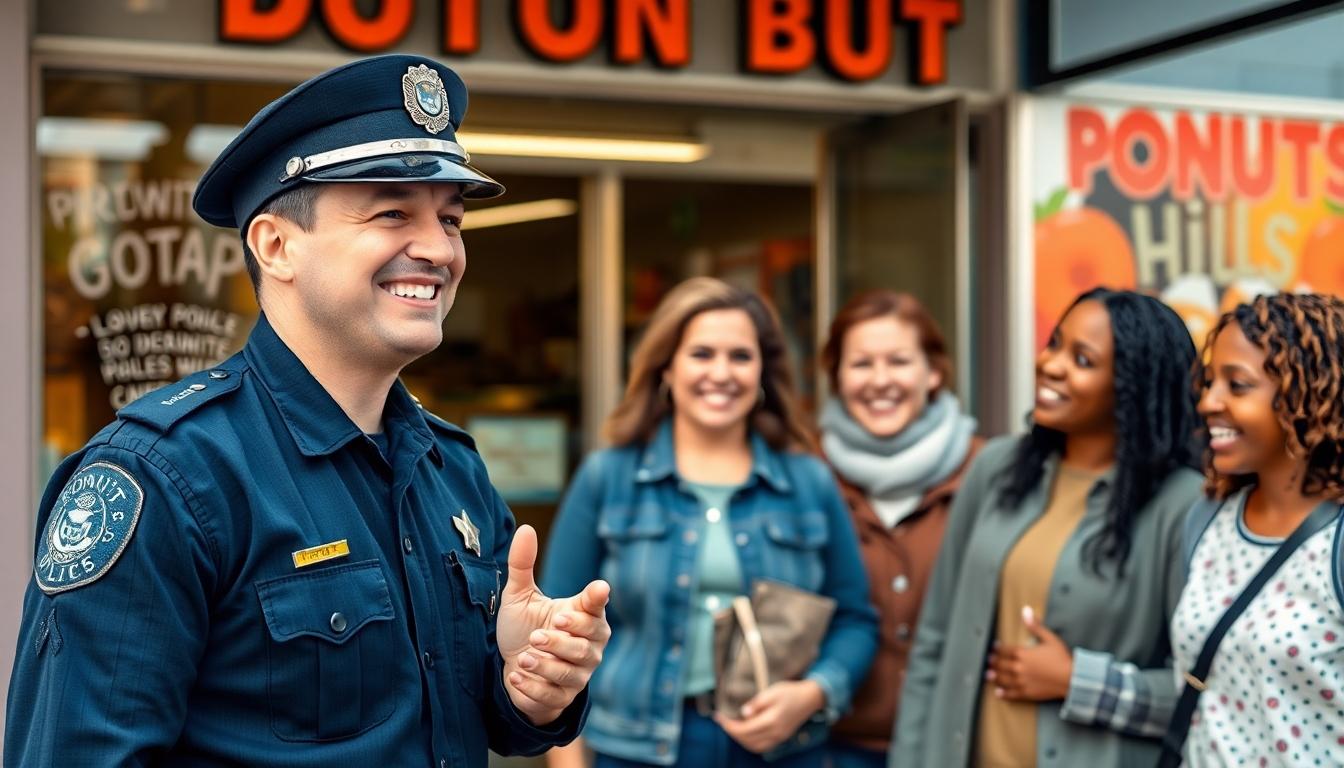
Familiar Themes That Never Get Old
Rookie jokes form the backbone of police department humor, often revolving around common stereotypes that officers embrace with good humor. These jokes frequently feature donut-loving officers or first-year cops calling for backup in amusing situations. Veterans particularly enjoy sharing these lighthearted jabs with newcomers as part of the unofficial welcoming process. Every police station has at least one senior officer who keeps these jokes alive, ensuring they’re passed down through generations of law enforcement professionals.
Quick Wit in the Line of Duty
Police humor thrives on sharp, rapid exchanges that showcase officers’ ability to think on their feet. A classic example includes the driver who told an officer his hat makes him look older when questioned about speeding—a response that typically earns a chuckle rather than a ticket. These swift comebacks demonstrate the verbal dexterity that becomes second nature to many officers after years on the force. We’ve found that these brief humorous moments often defuse tense situations during routine stops.
Playful Interactions With the Public
Officers regularly engage in playful banter with civilians, creating memorable moments that humanize the badge. One recurring joke involves an officer stopping a speeding driver only to discover they were rushing to a donut shop—creating an ironic situation both parties can laugh about. These interactions help build positive relationships between law enforcement and community members. Police departments across the country encourage these good-natured exchanges as they help overcome the intimidation factor many civilians feel when interacting with officers.
Wordplay and Puns That Stick
Law enforcement humor relies heavily on clever wordplay, with officers crafting puns related to their “serve and protect” motto. These jokes often extend into sports contexts, like volleyball references that blend police terminology with athletic language. Veteran officers proudly share their most groan-worthy puns with rookies, creating a tradition of humor that spans decades. Departments nationwide have developed their own signature puns that reflect local culture while maintaining the universal appeal of police humor.
Colleagues’ Humor About Rookies
First-year officers inevitably become the subject of good-natured ribbing from their more experienced colleagues. A popular joke features a rookie dramatically calling for backup only to reveal they need help arresting their own mother. These jokes serve an important purpose beyond mere entertainment—they help integrate new officers into the department culture while building resilience. We’ve observed that departments with thriving humor cultures typically report stronger team cohesion and better stress management among their ranks.
Law Enforcement Humor That Keeps the Peace While Breaking the Tension
Humor remains one of law enforcement’s most valuable unwritten tools. From donut jokes to courtroom quips these moments of levity serve a crucial purpose in maintaining officer mental health and building community connections.
We’ve seen how jokes become part of department culture helping rookies integrate while providing veterans with necessary emotional release. The strategic use of humor in tense situations transforms officers from authority figures into relatable humans with a badge.
Next time you interact with law enforcement remember that behind every uniform is someone who likely appreciates a good laugh as much as you do. Just maybe save your speeding jokes for after they’ve decided whether to give you a ticket!
Frequently Asked Questions
Why do police officers use humor in their line of duty?
Police officers use humor as a coping mechanism for job-related stress and to defuse tense situations. Humor helps them build camaraderie with colleagues, humanize interactions with the public, and maintain mental resilience in challenging circumstances. It serves as an emotional release valve in a profession that regularly encounters difficult situations.
What’s the origin of the police officer and donut stereotype?
The stereotype originated in the mid-20th century when donut shops were among the few establishments open late at night, making them convenient stops for officers on patrol. The practical reasons (24-hour availability, quick service, and portability) made donuts popular among officers working overnight shifts. Media portrayals then amplified and cemented this association in popular culture.
How do rookie officers experience humor in police departments?
Rookies are often the targets of good-natured jokes and pranks that serve as unofficial rites of passage. These jokes typically revolve around their inexperience and eagerness. While sometimes challenging, this humor helps integrate newcomers into department culture, builds resilience, and establishes relationships. Most officers look back fondly on these experiences once they’ve “earned their stripes.”
What role does humor play during traffic stops?
Humor during traffic stops helps reduce tension, humanize officers, and increase compliance. Officers often use lighthearted remarks to transform potentially antagonistic encounters into more cooperative exchanges. “Endless ticket” jokes and humorous observations about driving behavior serve to acknowledge the awkwardness of the situation while maintaining authority.
How does humor function in police K-9 units?
In K-9 units, humor centers around the unique partnership between handlers and their canine partners. Jokes highlight the contrast between the dogs’ serious work capabilities and their playful, sometimes unpredictable behavior. This specialized humor strengthens bonds between handlers and helps them process the demanding nature of K-9 training and deployment.
What types of humor do officers use in courtroom settings?
In courtrooms, officers employ subtle wit and situational humor that respects legal decorum while easing tension. They often use humor during testimony to cope with emotional stress and develop unique comedic relationships with judges, prosecutors, and even defense attorneys. This controlled humor helps navigate the formality of court proceedings while maintaining professionalism.
How does patrol car humor differ from other police humor?
Patrol car humor is uniquely intimate, developed between partners who spend hours together in confined spaces. This humor forms through shared experiences and observations about repeat calls, neighborhood characters, and department quirks. Partners develop inside jokes and communication shorthand that strengthens their working relationship and helps manage the unpredictable nature of patrol work.
Do police officers really appreciate jokes about their profession?
Most officers appreciate good-natured jokes about policing as long as they don’t undermine respect for the profession’s challenges. Officers themselves are often the best sources of police humor because they understand the nuances of the job. They generally respond well to jokes that acknowledge their humanity rather than those that perpetuate negative stereotypes.

